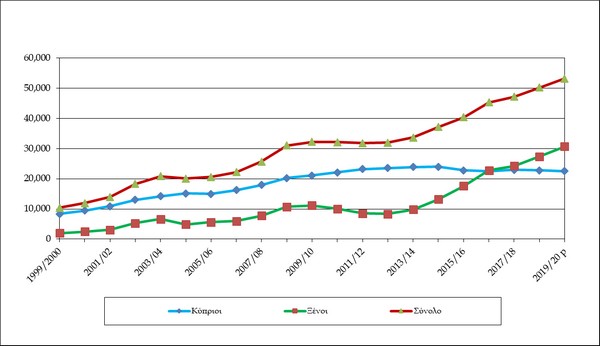Proposals of the Cyprus Economy and Competitiveness Council
There are currently ten universities in Cyprus, seven private and three public. University education has become an important area of economic activity, with positive implications for society as well as a source of income for the economy. The number of higher education students has doubled in 12 years and now exceeds 50 thousand, of which 44% are EU nationals and 16% come from third countries.
Chart: Number of Students 2000-2020

Universities' total contribution to GDP is difficult to estimate as, in addition to direct revenue from tuition and housing costs, the economy benefits from improved workforce, research and culture development, and overall improvement the quality of life of the total population. There are significant prospects for further improvement of Cyprus's position as an international higher education center. University education is considered by the Council of Economy and Competitiveness a priority area in a new, modern model of the Cypriot economy, as reflected in "Vision 2035", ie the new Long-Term Strategy for the Sustainable Development of the Cypriot economy, which revolves around axes of long-term sustainable development, competitiveness and enhancing the well-being of citizens.
Education and training play an important role in achieving the "Vision 2035", providing the human resources with the necessary skills and qualifications needed to make the Cypriot economy even more competitive. As part of the long-term strategy, various employment promotion policies, the improvement of the quality of education, as well as mechanisms that ensure a better link between labor supply and demand have been activated.
Defining the new growth model, as well as identifying the key economic sectors, both existing and new, that can add more value to economic activity and therefore serve as the key to achieving long-term sustainable economic growth, should be to be the basis on which university curricula will be based.
In this context, the Cyprus Economy and Competitiveness Council is currently submitting the following proposals for further development of university education in Cyprus:
1. Development of a strategic plan for upgrading the role of Cyprus as a higher education and research center with the cooperation of educational institutions, research organizations, the Government and the social and economic partners.
The strategic plan could include:
|
2. Cooperation of the three medical schools in Cyprus through the creation of a joint university hospital.
University hospitals around the world are appreciated for the level of medicine they offer, for the training of medical and paramedical staff and for their contribution to scientific research. The operation of a common university hospital will help in the further development of medical schools. It will also contribute to the goal of transforming Cyprus into a regional health service center.
For this project, which will have wider implications for the society and economy of Cyprus, we will need:
|
3. Creating a center of excellence for new technologies.
The Center of Excellence will have the opportunity to participate in international developments around this current issue, to expand local knowledge and to offer solutions to joint programs with local companies and organizations.
The implementation of this proposal:
|
4. Facilitation of public universities in attracting foreign students.
In the field of public universities, Cypriot society has so far invested several hundred million euros. The results of this investment have been beneficial for the place. But that benefit will increase if public universities are able to use their infrastructure and people in programs aimed at prospective English-speaking students.
|
5. Better connection of universities with businesses.
Universities will be able to increase their added value to better meet market needs through:
|
6. Facilitation of employment of students and graduates.
|
7. Provide incentives to attract higher education institutions / schools in disadvantaged areas, such as mountainous, rural and tourist areas that are significantly affected by seasonality.
Attracting higher education institutions in disadvantaged areas can have direct and indirect benefits to local economies but also to the wider economy in general through multiplier benefits. In addition to the economic activity of the institutions themselves in the local economy, student accommodation in these disadvantaged areas has the potential to revitalize them financially, improve their quality of life, combat astyphilia and attract new residents. Especially for tourist areas with seasonality problems, the multiplier benefits can be even greater, since the training programs are conducted mainly in the winter months where economic activity is limited. In addition to contributing to the reduction of seasonality and the attraction of tourism throughout the year in tourist areas, the operation of higher education programs related to local economies will contribute to increasing the productivity and quality of the products and services offered.
Attracting higher education institutions in disadvantaged areas can be achieved through:
|
